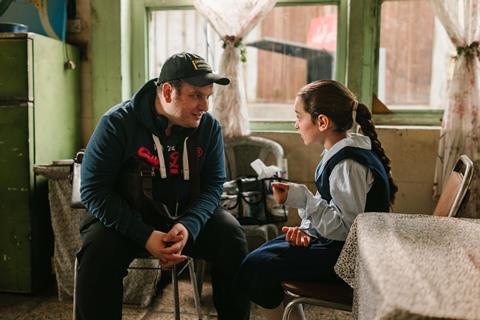
Just when young Iraqi director Hasan Hadi’s debut feature The President’s Cake looked like it might have to be delayed or abandoned, help came from an unexpected quarter: Chris Columbus, the director of the first two Harry Potter movies and Home Alone.
“Michelle Satter [from the Sundance Institute] made some magical calls to make sure we could keep our production dates,” recalls Hadi. “Shooting in Iraq is very tricky because of the weather. It’s only from November to April that you can shoot. After that, it’s too hot, almost impossible. If we miss that window, we must postpone the shoot for another six to eight months.”
Thanks to Satter, Maiden Voyage Pictures, the company run internationally by Columbus and his daughter Eleanor, learned about the project. Hadi found himself on a zoom call with Columbus, who “loved” the script. Maiden Voyage came aboard.
Hadi’s crowdpleaser, screening in Directors’ Fortnight and sold internationally by Films Boutique, is a co-production between two unlikely filmmaking partners: Iraq and the US (there is also support from Qatar’s Doha Film Institute). Set in 1991, during the brutal regime of president Saddam Hussein, it is about nine-year-old Lamia (Baneen Ahmad Nayyef), a girl chosen among her classmates to prepare a cake to celebrate Saddam’s birthday. The hitch is that she and her grandmother are living in abject poverty. Procuring the flour, eggs and sugar to make the cake is a terrible challenge but Lamia knows if she fails, she could be in big trouble.
Accompanied by her grandmother and the family rooster, the girl ventures into the city in search of baking ingredients she cannot afford to pay for anyway. There, she comes across the doe-eyed, Artful Dodger-like Saeed (Sajad Mohamad Qasem).
Chance discovery
Casting the two young leads was a huge challenge. “We needed two kids who could carry this film throughout, [but] we don’t have acting schools for children in Iraq,” says the director. Qasem was discovered by chance when he arrived at a café that was being scouted by the crew. Hadi asked if he wanted to be in a film. “No,” came the reply, and the boy subsequently vanished. Happily, the production was able to track him down.
“For the girl, we had a much harder time,” says Hadi. “We were looking for a girl from a certain background, from the Marshes [a wetland area in the country’s south]. But people from that background don’t want their daughters on camera, acting.” Only days before production was due to start, a casting assistant came in with a clip of Nayyef.
Growing up in Iraq, Hadi discovered filmmaking by watching old VHS movies — everything from Godzilla to the films of Roberto Rossellini and Jackie Chan — on a tiny family TV. He won a scholarship to New York University, but Donald Trump’s immigration policies in his first term delayed Hadi’s arrival by three years. The President’s Cake was developed through the Sundance Lab, where it found ardent champions in writer/director Marielle Heller (Can You Ever Forgive Me, Nightbitch) and Oscar-winning screenwriter Eric Roth (Forrest Gump), who became executive producers.
Each provided the young Iraqi director with a combination of creative advice and practical support. For example, Heller linked Hadi up with United Talent Agency, which is handling the North America sale with WME. Hadi was also working again with producer Leah Chen Baker, who he met at NYU and who also produced his short Swimsuit, which was distributed by HBO Max.
The director did not compromise. When he was offered finance if he agreed to shoot outside Iraq, perhaps in more film-friendly locations such as Jordan or Morocco, he refused to take it. “The DNA of this film is in Iraq, in the Marshes and Baghdad. I wanted to break the stigma about Iraq. Everybody has this image of what Iraq looks like,” says Hadi of how he set out to challenge stereotypes about his war-torn homeland.
In advance of the Cannes premiere, Films Boutique has already sold the movie to France (Tandem) and Benelux (September Film). A US deal is expected to be announced soon. The filmmakers are also planning a theatrical release in Iraq and potentially to “take the film to local communities, people in the Marshes who helped me to make this film”.
How does Hadi expect Iraqi viewers will react to a film financed and produced by Americans, given the fraught relationship between the two countries? He acknowledges some Iraqis “may be sensitive” to the US involvement in the film, and that some Americans may have reservations of their own. “But I didn’t want to make any political statement. I just wanted to show this period that has been impacting Iraq and Iraqis to this very day.”















![[L-R]: Amanda Villavieja, Laia Casanovas, Yasmina Praderas](https://d1nslcd7m2225b.cloudfront.net/Pictures/274x183/6/4/1/1471641_pxl_20251224_103354743_618426_crop.jpg)








![[L-R]: Amanda Villavieja, Laia Casanovas, Yasmina Praderas](https://d1nslcd7m2225b.cloudfront.net/Pictures/100x67/6/4/1/1471641_pxl_20251224_103354743_618426_crop.jpg)
No comments yet